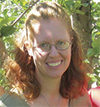At the end of a long day of farming, if you take a mental look back at all the people you came into contact with throughout the day, how many were female?
In the agriculture industry today, there seems to be plenty of females working in every area, but did you know that a career in agriculture for women is considered non-traditional?
The U.S. Department of Labor defines a non-traditional occupation as one where individuals from one gender comprise less than 25 percent of all the individuals employed within that occupation. With around a 50-50 ratio in my agriculture classes at Southwest Tech, I never thought of agriculture as a non-traditional female occupation, but it is.
This came to my realization this past school year, when I was approached by the adviser on campus who handles non-traditional occupations to do an activity for the women in the agriculture programs. We had Carrie Mess, also known as Dairy Carrie, come share her story.
We talked about how to handle the salesmen who stop on the farm and will only talk to your husband or father to balancing farming and family to many other issues women sometimes face. It got me thinking: Are we really still considered a minority? Statistically we are, but when I interact with women in agriculture on a daily basis, I don’t feel like it.
According to the 2012 USDA Census of Agriculture, less than 30 percent of farmers were women. Of that, around 14 percent were principal operators. In researching this topic, I found articles by a number of agriculture colleges across the country stating that the number of females studying agriculture keeps climbing.
Why is agriculture and farming considered a non-traditional female occupation? Why are young women continually seeking to study and work in this industry? The answer is simple. Women find jobs in agriculture interesting and rewarding, they feel satisfied in their careers, and they can be independent.
Every day is different in agriculture. Sure, we have routines that are the same, but outside of them you never know what is going to happen or who is going to stop by. We get to experience situations like a calf taking its first breath, watching a corn plant peek out of the soil, a farmer tilling the ground, working with the 4-Her and their animal to find the perfect ration, and the list could go on.
Not only are these situations interesting, they are often rewarding. You feel good helping the newborn calf stand or working together with family to get the crop in the ground before the storm.
Time and time again, agriculture publications are filled with stories of women working in agriculture. A recent Dairy Star article shared the story of a farm in Iowa totally managed by a mom and her daughters. When you visit with women working in agriculture, you hear the satisfaction in their voices and stories as they talk about their jobs.
Women like to be independent. We like to make our own schedules and lay out a plan. Sure, there are certain aspects of chosen jobs that we have to listen to and follow, but for the most part, we are allowed that independence we crave.
Careers in sales, nutrition, marketing, production agriculture and more allow women to set their own schedule that works with the family. If the decision is made to chaperone a class field trip for a child, one might then balance a client’s ration after that same child is tucked in bed for the night. Flexibility and independence all at the same time wrapped up in a career in agriculture.
I will admit that being a woman working in agriculture isn’t always roses. Growing up as the oldest of three daughters on a first-generation vegetable farm in northern Illinois, I didn’t know I was a minority.
It wasn’t until I entered my teenage years and started working off the farm as a crop scout I felt like a minority. There were only two females working for the firm out in the field. I do recall feeling a bit uncomfortable at some weekly staff meetings when the men would start cracking rude jokes or talking about women.
In college, I had both male and female professors along with a healthy ratio of males to females in my agriculture classes. In my first job after college graduation, I was one of only a handful of female agriculture instructors in southwest Wisconsin, and the first for Fennimore High School. The good news is: I don’t feel like a minority today.
As I look back at my day and think of the women in agriculture I came across, there’s my nutritionist, the veterinarian’s assistant, the milk inspector, a teacher, a farmer, an A.I. technician and an agronomist. Women in agriculture might be a minority on paper to the government, but in life, I sure don’t feel like it. PD

-
Christina Winch
- Dairy Producer
- Fennimore, Wisconsin










